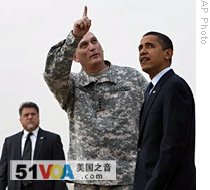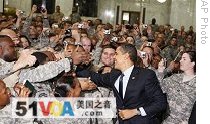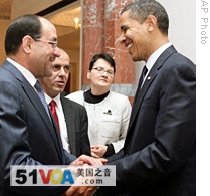Istanbul, Turkey
07 April 2009
 |
| President Barack Obama is greeted by Gen. Ray Odierno, top US commander in Iraq, as he arrives in Baghdad, 07 Apr 2009 |
Air Force One slipped unannounced into Baghdad International Airport after a roughly two-hour flight from Istanbul.
It was Mr. Obama's first trip to Iraq as president - following one as part of a U.S. Senate delegation in 2006 and a solo visit as a presidential candidate last year.
The main focus of Tuesday's stop was to give the president a chance to meet in person with U.S. troops in Iraq and their commanders.
 |
| President Barack Obama greets military personnel at Camp Victory in Baghdad, 7 April 2009 |
"You have performed brilliantly in every mission that has been given to you. Under enormous strain and under enormous sacrifice, through controversy and difficulty and politics, you have kept your eyes focused on just doing your job," he said.
President Obama told them the U.S. military operation in Iraq is at a crucial point - as the American presence begins to draw down and Iraqis take charge of their own security.
"It is time for us to transition to the Iraqis. They need to take responsibility for their country and for their sovereignty. And in order for them to do that, they need to make political accommodations," he said.
Mr. Obama said the United States cannot make difficult decisions for the Iraqi government. But he told the troops at Camp Victory that America will be a stalwart partner as the United States moves from a combat role to a greater emphasis on training the Iraqi armed forces.
"You will be critical in terms of us being able to make sure that Iraq is stable, that it is not a safe haven for terrorists, that it is a good neighbor and a good ally, and we can start bringing our troops home," he said.
While at Camp Victory, the president met privately with the top U.S. commander in Iraq, Army General Ray Odierno, and assured him that his administration's new emphasis on Afghanistan and Pakistan does not mean a lessening of its commitment to Iraq.
Mr. Obama originally planned to travel by helicopter to Baghdad's fortified Green Zone to meet face-to-face with Iraqi Prime Minister Nouri al-Maliki and President Jalal Talabani.
But poor visibility changed those plans. The Iraqi leaders went to Camp Victory instead.
 |
| US President Barack Obama (R), meets with Iraqi PM Nouri al-Maliki (L) in Baghdad, 07 Apr 2009 |
Mr. Obama's visit came at the end of a long overseas journey that included an economic summit in London, a gathering of NATO allies on the French-German border, talks with European Union leaders in Prague and a visit to Turkey.
In Turkey, Mr. Obama continued his outreach to the Muslim world. He took part in an unprecedented question and answer session with young people in this predominantly Muslim country and talked with candor about tensions between East and West.
One student asked President Obama whether there is a real difference between his policies and those of his predecessor, George Bush.
Mr. Obama noted that policy changes take time to complete - that the ship of state is like an ocean tanker that does not turn quickly, but eventually gets to the right place. He said that as much as he wants to bring all U.S. troops home from Iraq, it is important to do it the right way.
"Some people might say, 'Wait, I thought you were opposed to the war. Why don't you just get them all out right away?' Well, just because I was opposed at the outset, it doesn't mean that I don't now have responsibilities to make sure that we do things in a responsible fashion," he explained.
The president has already announced plans to remove most U.S. combat forces from Iraq by the end of 2010.